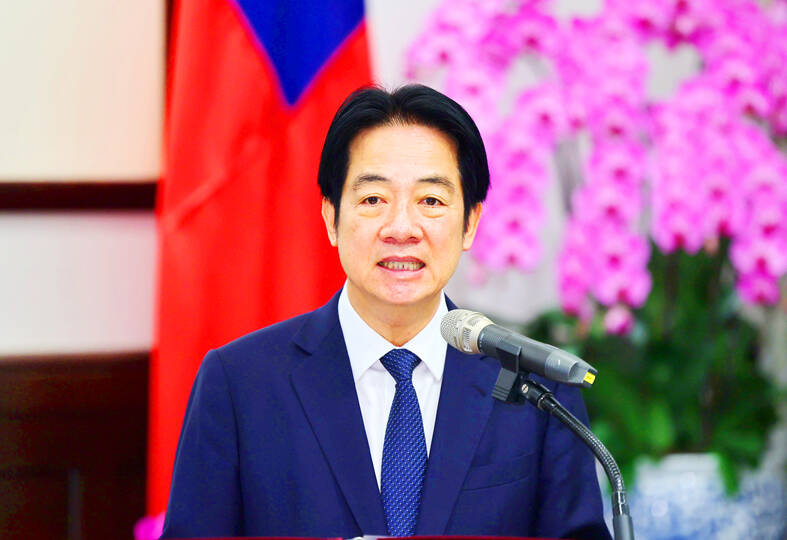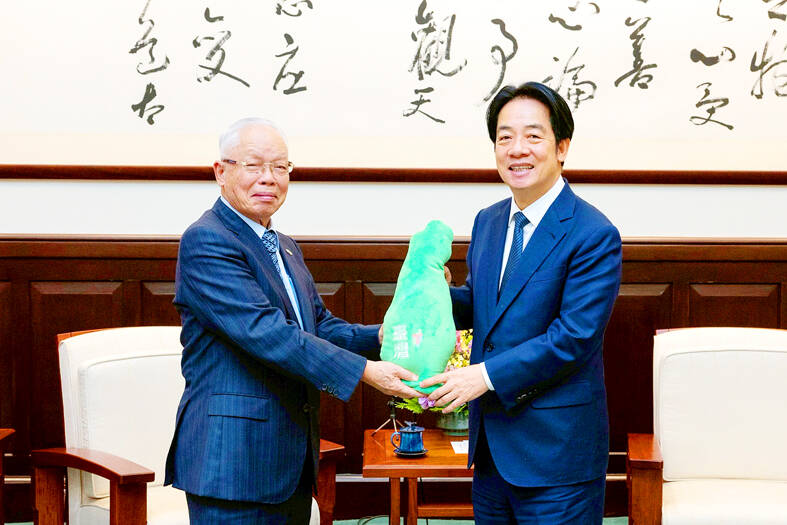President William Lai (賴清德) yesterday touted Taiwan’s technology ties with Japan, while reiterating Taipei’s commitment to investing heavily in the development of artificial intelligence (AI) technology and the biomedical industry.
In a meeting with representatives of the All Japan Taiwanese Union at the Presidential Office in Taipei, Lai said that the two countries have supported each other through earthquakes and pandemics, and Taiwan hopes they can take that relationship further, aiding each other in developing their tech industries.
Taiwan Semiconductor Manufacturing Co’s (台積電) investment in Japan’s Kumamoto Prefecture is not only a corporate investment, but also serves to increase the resilience of Taiwanese and Japanese industries, as well as bolster the competitiveness and capabilities of the pan-democratic semiconductor supply chain, the president said.

Photo: CNA
Taipei hopes to work with Tokyo on trade, technology, security, renewable energies and digital transition for a more resilient partnership, he said, while thanking the All Japan Taiwanese Union for its efforts to foster Taiwan-Japan ties.
Taiwan is focused on AI development and has launched the 10 “New AI Major Infrastructure Projects,” to develop quantum technology, silicon photonics, robotics and other key technologies, he added.
The initiative would help industries use AI to take Taiwan into an era of “smart” technologies, Lai said.

Photo: screen grab from the Presidential Office’s Flickr page
It aims to advance the deployment use of smart devices, develop critical technologies and accelerate the development of relevant infrastructure, while gradually integrating AI into these areas, the Lai administration said.
The policy builds on the “five trusted industry sectors” policy to develop semiconductors, AI, national defense, surveillance and security, and next-generation communications, ensuring that all industries in Taiwan gradually transition to complete digitization.
Lai also touted Taiwan’s “National Project of Hope,” which aims to make the biotech industry a second powerhouse after semiconductors by developing smart medicine, advancing medical research and leveraging Taiwan’s technical edge in the medical industry.
The government will continue to enhance its competitive edge and deepen connections with democratic partners to help Taiwan gain greater influence on the international stage and contribute more toward peace and prosperity in the Indo-Pacific region, he added.
In related news, the Ministry of National Defense has established an AI office to explore the emerging technology’s potential military applications, a senior military official said yesterday.
The office, currently operating on a trial basis, mainly promotes the integration of AI into image and video detection, computer security and anti-hacking systems, said Lieutenant General Huang Wen-chi, director of the Department of Strategic Planning.
The extent to which AI would be used for military purposes, including combat, would depend on the technology’s maturity and development, he said.
Additional reporting by CNA

CALL FOR SUPPORT: President William Lai called on lawmakers across party lines to ensure the livelihood of Taiwanese and that national security is protected President William Lai (賴清德) yesterday called for bipartisan support for Taiwan’s investment in self-defense capabilities at the christening and launch of two coast guard vessels at CSBC Corp, Taiwan’s (台灣國際造船) shipyard in Kaohsiung. The Taipei (台北) is the fourth and final ship of the Chiayi-class offshore patrol vessels, and the Siraya (西拉雅) is the Coast Guard Administration’s (CGA) first-ever ocean patrol vessel, the government said. The Taipei is the fourth and final ship of the Chiayi-class offshore patrol vessels with a displacement of about 4,000 tonnes, Lai said. This ship class was ordered as a result of former president Tsai Ing-wen’s (蔡英文) 2018

‘SECRETS’: While saying China would not attack during his presidency, Donald Trump declined to say how Washington would respond if Beijing were to take military action US President Donald Trump said that China would not take military action against Taiwan while he is president, as the Chinese leaders “know the consequences.” Trump made the statement during an interview on CBS’ 60 Minutes program that aired on Sunday, a few days after his meeting with Chinese President Xi Jinping (習近平) in South Korea. “He [Xi] has openly said, and his people have openly said at meetings, ‘we would never do anything while President Trump is president,’ because they know the consequences,” Trump said in the interview. However, he repeatedly declined to say exactly how Washington would respond in

WARFARE: All sectors of society should recognize, unite, and collectively resist and condemn Beijing’s cross-border suppression, MAC Minister Chiu Chui-cheng said The number of Taiwanese detained because of legal affairs by Chinese authorities has tripled this year, as Beijing intensified its intimidation and division of Taiwanese by combining lawfare and cognitive warfare, the Mainland Affairs Council (MAC) said yesterday. MAC Minister Chiu Chui-cheng (邱垂正) made the statement in response to questions by Democratic Progressive Party (DPP) Legislator Puma Shen (沈柏洋) about the government’s response to counter Chinese public opinion warfare, lawfare and psychological warfare. Shen said he is also being investigated by China for promoting “Taiwanese independence.” He was referring to a report published on Tuesday last week by China’s state-run Xinhua news agency,

‘NOT SUBORDINATE’: Only Taiwanese can decide the nation’s future, and people preserving their democratic way of life is not a provocation, President William Lai said Taiwan does not want China’s “one country, two systems,” and must uphold its freedom and democracy as well as resolve to defend itself, President William Lai (賴清德) said yesterday, rejecting Beijing’s latest bid to bring the country under Chinese control. The president made the remarks while attending a commissioning ceremony for Taiwan’s first battalion of M1A2T Abrams tanks in Hsinchu County’s Hukou Township (湖口). The tanks are made by General Dynamics, a major US defense contractor. China this week said it “absolutely will not” rule out using force over Taiwan, striking a much tougher tone than a series of articles in state media